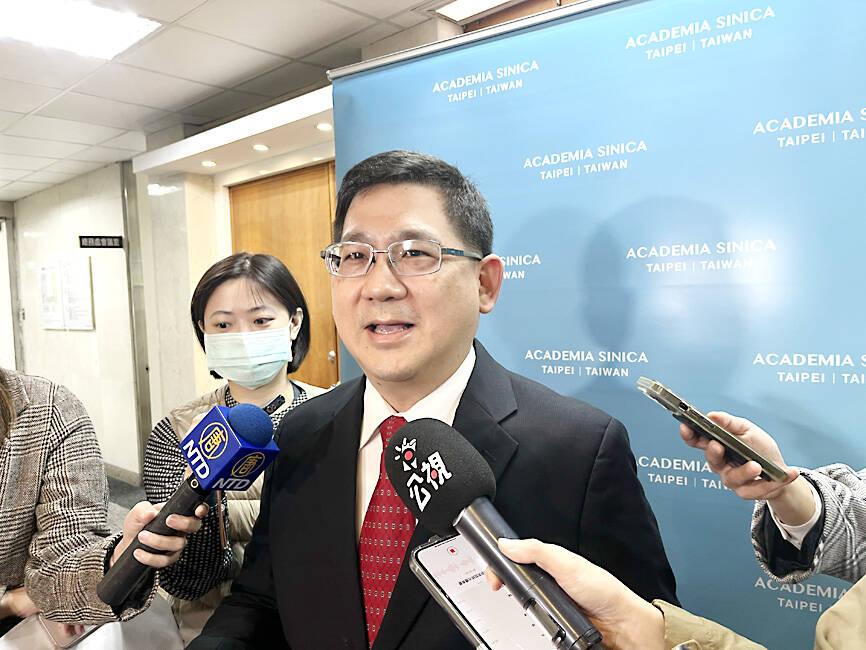Taiwan’s GDP should grow 3.02 percent next year due to higher exports driven by demand for emerging technologies such as artificial intelligence applications, Academia Sinica, the nation’s top research institute, said on Thursday.
The nation’s economy is to benefit from rising private investment led by a rebound in exports of information and electronic devices, as well as continued growth in private consumption, the institute said.
Should the forecast be accurate, it would top the 1.34 percent GDP growth anticipated by the institute for this year.

Photo: Hsu Tzu-ling, Taipei Times
The institute has twice revised its forecast for this year’s growth downward since projecting 2.41 percent real growth forecast for the year at the end of last year.
It revised that to 1.56 percent in July and then to 1.34 percent yesterday, citing a weakened global economy affected by fragile demand from end-users and bloated inventories that are still being drawn down.
The institute’s forecasts were slightly more cautious than those made by the government.
The Directorate-General of Budget, Accounting and Statistics (DGBAS) last month forecast that the nation’s GDP would grow 1.42 percent this year and 3.35 percent next year.
Lin Chang-ching (林長青), an adjunct research fellow at Academia Sinica’s Institute of Economics, said that exports, investment and consumption are all expected to drive the nation’s GDP growth next year, when the “local economy will see the spring arrive as the snow melts.”
Next year, the nation’s merchandise and service exports are expected to grow 6.23 percent after a 4.39 percent decline anticipated for this year, while imports are to grow 8.03 percent next year, compared with a predicted drop of 5.07 percent this year, he said, citing research by his department.
Solid demand for emerging tech applications and consumer electronics should spark the rebound in exports next year, he said.
Investment would also be higher as IT and electronics manufacturers invest in expanding capacity to meet stronger demand and the private sector invests more in green energy development to cut carbon emissions, he said.
Because of those factors, Academia Sinica forecast the nation’s private investment would grow 3.05 percent next year after a 9.70 percent decline anticipated for this year, with fixed capital formation to rise 4.23 percent next year from an anticipated 7.35 percent decline this year.
Academia Sinica also expected the nation’s private consumption to grow 3.01 percent next year, after an expected 8.32 percent increase this year, anticipating that greater cross-border travel, a 4.05 percent hike in the minimum wage and a 4 percent wage hike for government employees would boost spending.
While the nation’s economy would improve next year, the global economy remained vulnerable to uncertainties that could affect local growth, including downside risks of the Chinese economy and escalating trade tensions between Washington and Beijing, Lin said.
When asked about a move by China to suspend preferential tariff treatment for imports of 12 Taiwanese petrochemical products starting on Jan. 1, he said the impact would be limited.

CAUTIOUS RECOVERY: While the manufacturing sector returned to growth amid the US-China trade truce, firms remain wary as uncertainty clouds the outlook, the CIER said The local manufacturing sector returned to expansion last month, as the official purchasing managers’ index (PMI) rose 2.1 points to 51.0, driven by a temporary easing in US-China trade tensions, the Chung-Hua Institution for Economic Research (CIER, 中華經濟研究院) said yesterday. The PMI gauges the health of the manufacturing industry, with readings above 50 indicating expansion and those below 50 signaling contraction. “Firms are not as pessimistic as they were in April, but they remain far from optimistic,” CIER president Lien Hsien-ming (連賢明) said at a news conference. The full impact of US tariff decisions is unlikely to become clear until later this month

Popular vape brands such as Geek Bar might get more expensive in the US — if you can find them at all. Shipments of vapes from China to the US ground to a near halt last month from a year ago, official data showed, hit by US President Donald Trump’s tariffs and a crackdown on unauthorized e-cigarettes in the world’s biggest market for smoking alternatives. That includes Geek Bar, a brand of flavored vapes that is not authorized to sell in the US, but which had been widely available due to porous import controls. One retailer, who asked not to be named, because

CHIP DUTIES: TSMC said it voiced its concerns to Washington about tariffs, telling the US commerce department that it wants ‘fair treatment’ to protect its competitiveness Taiwan Semiconductor Manufacturing Co (TSMC, 台積電) yesterday reiterated robust business prospects for this year as strong artificial intelligence (AI) chip demand from Nvidia Corp and other customers would absorb the impacts of US tariffs. “The impact of tariffs would be indirect, as the custom tax is the importers’ responsibility, not the exporters,” TSMC chairman and chief executive officer C.C. Wei (魏哲家) said at the chipmaker’s annual shareholders’ meeting in Hsinchu City. TSMC’s business could be affected if people become reluctant to buy electronics due to inflated prices, Wei said. In addition, the chipmaker has voiced its concern to the US Department of Commerce

STILL LOADED: Last year’s richest person, Quanta Computer Inc chairman Barry Lam, dropped to second place despite an 8 percent increase in his wealth to US$12.6 billion Staff writer, with CNA Daniel Tsai (蔡明忠) and Richard Tsai (蔡明興), the brothers who run Fubon Group (富邦集團), topped the Forbes list of Taiwan’s 50 richest people this year, released on Wednesday in New York. The magazine said that a stronger New Taiwan dollar pushed the combined wealth of Taiwan’s 50 richest people up 13 percent, from US$174 billion to US$197 billion, with 36 of the people on the list seeing their wealth increase. That came as Taiwan’s economy grew 4.6 percent last year, its fastest pace in three years, driven by the strong performance of the semiconductor industry, the magazine said. The Tsai